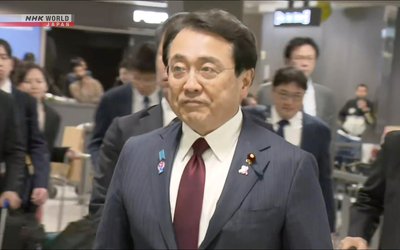
Close on the heels of two international summit meetings outside of its region, South Asia is witnessing own regional meeting of the heads of state and government. The Asia Pacific Economic Cooperation (APEC) meet in Beijing and the Group of 20 (G-20) meet in Brisbane hogged the world headlines throughout the month of November. But the South Asian Association of Regional Cooperation (SAARC) summit slated to be held in Kathmandu towards the end of the same month has evoked little international attention. When the top leaders of the one of the world's poorest regions meet in the Nepalese capital it will in all likelihood be overshadowed by the difficult relations between two of the regional grouping's biggest members -- India and Pakistan. That was what happened before and this is almost certain to be repeated one more time.
Not all members of the APEC and the G-20 groupings are on good terms. In fact, mutual differences far outweigh the similarities between some of the key members of the two groupings. But the forums have given them opportunity to sort out their differences. Take, for instance, this year's APEC summit. It was during the summit that China and the USA reached a landmark climate deal ending years of disagreement on reducing the carbon-emission. President Obama and President Xi both hailed the deal as a major breakthrough. It indeed was although the degree of jubilation over the agreement in Beijing and Washington was not the same. On another count, the host country China and Japan did succeed in bringing their turbulent bilateral relations to a new level. President Xi Jinping and Prime Minister Shinjo Abe showed great statesmanship to bring new air into the bilateral relationship that reduced the uneasiness if not added comfort yet. The Brisbane summit of G-20 too had its moment of glory in the sense that the world's developed countries and emerging economies held useful discussions on overcoming the challenges confronting international peace, stability and development.
No such achievement is expected when the eight countries of South Asia meet in Kathmandu next week for the 18th edition of the regional summit. The reason is not very far to see. Mutual mistrust and suspicion that came in the way of mutually beneficial regional cooperation over the past three decades of the SAARC remain where they were before. Rich rhetoric apart there has been practically no action in working together for the collective good of the region. There has been no indication that this is going to change this time around. As much has become clear by a seemingly trivial issue -- the refusal of a member country to use the car provided by another member for the summit meeting. Yes, the issue is that of Pakistan saying 'no' to using India-provided bullet-proof car for the head of the state and the governments participating in the summit. Prime Minister Nawaz Sharif is bringing own bullet-proof car. India would have certainly done exactly the same had Pakistan provided cars to Nepal for the summit purpose.
Amidst such uneasy relations despite being grouped together in the regional forum, India and Pakistan have not been able to make most of the SAARC forum to bridge their differences and come together for the collective good of the region that houses one-sixth of the global population and majority of the world's poor. Instead, the relationship between the two has only worsened every time the two leaders have met on the sidelines of the SAARC. Every time the summit meeting between the top leaders of India and Pakistan on the sidelines of SAARC does overshadow the summit, hogs the headline and raise lots of expectations. Every time disappointment follows. It is the noble idea of regional cooperation that suffers the most. Not surprisingly, there is not a single thing the SAARC can boast of in terms of regional cooperation except on rhetoric and goody-goody worded documents. So much so that even the headquarters of SAARC has been reduced to a leisurely office of the region's diplomats.
Kathmandu is hosting the SAARC summit for the third time. As things stand now and as the experiences over the years show, this will be no different from the first one held 27 years ago.
- Ukrainian Crisis And The World (Dis)Order
- Apr 22, 2022
- China’s Cautious Steps In The Graveyard Of Empires
- Aug 18, 2021
- Foreign Aid On The Fence!
- Aug 08, 2021
- Communist Party of China centenary celebrations Reading between the lips
- Jul 14, 2021
- Second Wave Of Covid-19 In India: Deadly Blow To The Economy
- Jun 23, 2021















